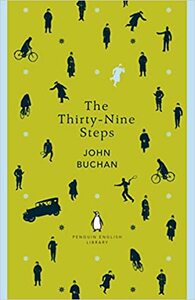Take a photo of a barcode or cover
We have had a season subscription to our local community theater group for as long as we've lived in Reading. Recently, they did an adaption of this novel of Buchan's, which was an early spy thriller, or something. Now that I have "mature" hearing, I didn't get a whole lot of the dialog. Much of it was in appropriate dialect, i.e. Scotts when in Scotland, working class London for the local milkman and so forth, which didn't help my hearing impairment. The dialogue also came fast and furious, as they were playing this as a comedic farce. Even though I didn't know what was going on much of the time, it did seem rather funny. So anyway, I figured I should check out the original. Unfortunately, there was enough of a gap between seeing and reading, that I'm not sure how faithful the play adaption was.
Whatever, this was a reasonably fun book, if perhaps a bit silly. Buchan makes it clear in his introduction that the book was meant to be pulp fiction, only vaguely plausible, but not totally impossible. I guess that's what the working class folks liked reading on their bus rides to and from the factories a century ago.
So, we have a young man, Richard Hannay, who made a fortune in Africa and has come back to Britain. He's bored out of his mind. His upstairs neighbor suddenly shows up and spins a tale about how he is a "dead man", meaning he has to pretend to be dead because some German spies are coming for him. He knows the secret of their plot, which will be unveiled in about two weeks' time, but he can't tell the authorities until the last minute. Something like that. So the guy wants to hide out in Hannay's digs.
Well, next thing you know, Hannay comes home and finds the guy had been stabbed. Hannay has to flee for his life. This involves hiding out in Scotland. The only problem is that the "bad guys" are on his tail almost immediately. He can't hide in the moors because they have an airplane. He can't hide in the villages because the bobbies are trying to arrest Hannay for the murder of the guy found stabbed in his study. So, we have all kinds of improbably escapes, and meeting up with weird characters, and Hannay's taking on different disguises, and so forth. Eventually, at the last minute, they catch the bad guys and save Britain from war (for a bit, anyway, WWI broke out shortly after this book was published).
Well, I just discovered that the play I saw was an adaptation of an Alfred Hitchcock movie. The plot has some similarities to this book, and many differences. Whatever, it was a fine book for light reading, and short enough that even one who "reads at only half the speed required for success in college" could finish it in a reasonable period of time.
Whatever, this was a reasonably fun book, if perhaps a bit silly. Buchan makes it clear in his introduction that the book was meant to be pulp fiction, only vaguely plausible, but not totally impossible. I guess that's what the working class folks liked reading on their bus rides to and from the factories a century ago.
So, we have a young man, Richard Hannay, who made a fortune in Africa and has come back to Britain. He's bored out of his mind. His upstairs neighbor suddenly shows up and spins a tale about how he is a "dead man", meaning he has to pretend to be dead because some German spies are coming for him. He knows the secret of their plot, which will be unveiled in about two weeks' time, but he can't tell the authorities until the last minute. Something like that. So the guy wants to hide out in Hannay's digs.
Well, next thing you know, Hannay comes home and finds the guy had been stabbed. Hannay has to flee for his life. This involves hiding out in Scotland. The only problem is that the "bad guys" are on his tail almost immediately. He can't hide in the moors because they have an airplane. He can't hide in the villages because the bobbies are trying to arrest Hannay for the murder of the guy found stabbed in his study. So, we have all kinds of improbably escapes, and meeting up with weird characters, and Hannay's taking on different disguises, and so forth. Eventually, at the last minute, they catch the bad guys and save Britain from war (for a bit, anyway, WWI broke out shortly after this book was published).
Well, I just discovered that the play I saw was an adaptation of an Alfred Hitchcock movie. The plot has some similarities to this book, and many differences. Whatever, it was a fine book for light reading, and short enough that even one who "reads at only half the speed required for success in college" could finish it in a reasonable period of time.
I picked this up because it was free and because I thought it was the same story that the Hitchcock movie was about. I actually don't remember what the movie was about but this story didn't read like a Hitchcock movie. Its a pretty short (good) well written book. The first third is strong, the middle third drags, and the end gets better again.
A fun adventure story full of the close encounters and unlikely coincidences that make great fiction
“Then began an unholy row. They were all on me at once, and the policeman took me in the rear. I got in one or two good blows, for I think, with fair play, I could have licked the lot of them, but the policeman pinned me behind, and one of them got his finges on my throat.”
sorry i did laugh at this a little bit
sorry i did laugh at this a little bit
was this the most groundbreaking, thrilling novel? no. was it as bad as some people in the reviews make it out to be? also no. it was a solid three-star novel(-la?), which on my rating scale means it isn’t awful, which is good enough for me because i managed to finish it and enjoy some parts a lot. would i read it again? …no, but i’m glad i read it.
The 39 Steps is often regarded as a proto-spy-thriller and one of the founding texts of the genre. Not the first one ever, but a very early one. And now that I've finished it I can safely say that it really deserves to be hailed as an influential book.
It's not a masterpiece even by the standards of its time, but what makes it innovative is its pacing and structure. The writing is bland at times, the paragraphs long, at places a bit hard to follow. But overall the plot moves like a crazed freight train and the main focus of the story is indeed preventing intelligence from being stolen, and if that doesn't make this a very clear-cut spy novel, I have no idea what would.
The characters aren't too deep, the dialogue isn't the best, the story isn't revolutionary, but they all come together quite nicely to form a very-well paced, very well-rounded early thriller.
My quest to read the influential books of the Western thriller genre hasn't always led me to very enjoyable experiences, but I have to give it to John Buchan, I enjoyed this one. And I'm even more impressed to think that it's over 100 years old.
There are literary masterpieces that are hundreds of years old, but thrillers are relatively young compared to, say, classics, and older ones often don't read very well. This isn't one of them. Keep your expectations as low as you can and just enjoy the ride.
It's not a masterpiece even by the standards of its time, but what makes it innovative is its pacing and structure. The writing is bland at times, the paragraphs long, at places a bit hard to follow. But overall the plot moves like a crazed freight train and the main focus of the story is indeed preventing intelligence from being stolen, and if that doesn't make this a very clear-cut spy novel, I have no idea what would.
The characters aren't too deep, the dialogue isn't the best, the story isn't revolutionary, but they all come together quite nicely to form a very-well paced, very well-rounded early thriller.
My quest to read the influential books of the Western thriller genre hasn't always led me to very enjoyable experiences, but I have to give it to John Buchan, I enjoyed this one. And I'm even more impressed to think that it's over 100 years old.
There are literary masterpieces that are hundreds of years old, but thrillers are relatively young compared to, say, classics, and older ones often don't read very well. This isn't one of them. Keep your expectations as low as you can and just enjoy the ride.
I will say, one of the best things about this book is how short it is.
Okay, okay, that's not exactly right.
The first half of this book, I actually genuinely enjoyed. It's a jaunty little tale, told in that typically very early-20th century style, where there's minimal characterisation and it's more a series of humourous events happening to a gent who sort of goes along with it all because he's bored. The chapters here are short and self-contained, the sort of thing you'd expect to read in local magazines of the time.
And then it escalates... but the stakes never feel quite high. See, the problem with stories that evolve over events and not characterisation is that I never feel drawn into the narrative. How can I trust the stakes are high when it never feels that way?
I'll say this, however: part of the longevity of this book, I believe, is that it ushered in the spy genre. Though I may not enjoy this book as fully as others, I can appreciate it for that reason... even if I personally don't like spy novels.
Okay, okay, that's not exactly right.
The first half of this book, I actually genuinely enjoyed. It's a jaunty little tale, told in that typically very early-20th century style, where there's minimal characterisation and it's more a series of humourous events happening to a gent who sort of goes along with it all because he's bored. The chapters here are short and self-contained, the sort of thing you'd expect to read in local magazines of the time.
And then it escalates... but the stakes never feel quite high. See, the problem with stories that evolve over events and not characterisation is that I never feel drawn into the narrative. How can I trust the stakes are high when it never feels that way?
I'll say this, however: part of the longevity of this book, I believe, is that it ushered in the spy genre. Though I may not enjoy this book as fully as others, I can appreciate it for that reason... even if I personally don't like spy novels.





